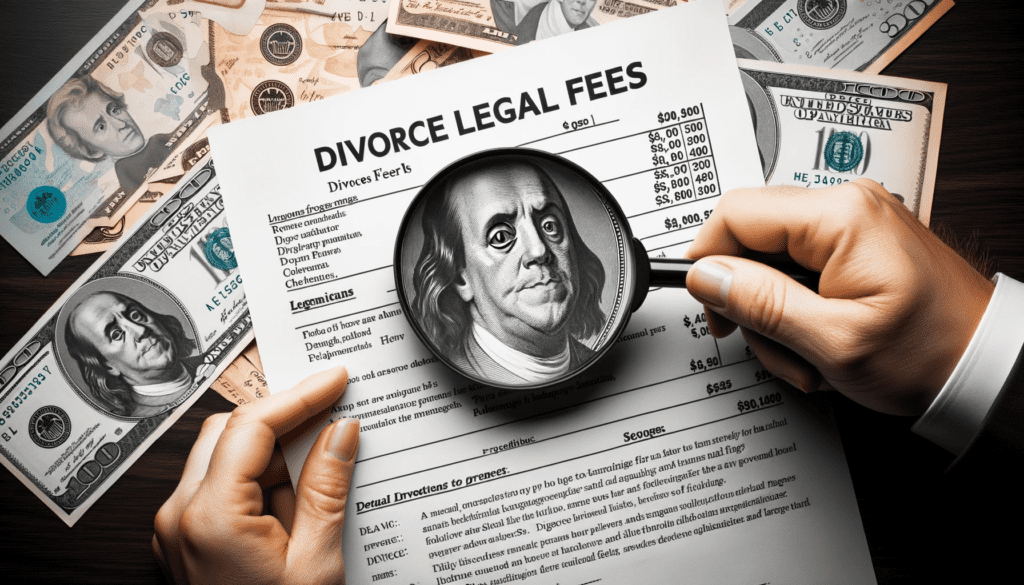Divorce proceedings are often stressful and complicated, and the financial aspects of the process can add to the difficulties. Understanding the costs involved in a divorce is crucial for making informed decisions. In this comprehensive guide, we will explore the various factors that affect divorce costs, including legal fees and additional expenses.




Key Takeaways
- Divorce costs can be significant, and it’s essential to understand the factors that contribute to them.
- Legal fees play a significant role in divorce costs, and different types of legal representation can affect expenses.
- The complexity of the case, the need for expert opinions, and the level of cooperation between both parties can influence legal fees.
- Understanding fee structures, including hourly rates, fixed fees, and retainer agreements, can help you navigate the financial aspects of your divorce.
- Additional expenses, such as court filing fees and expert witness fees, can add to the overall costs of a divorce.
The Role of Legal Representation in Divorce
In divorce cases, legal representation plays a critical role in navigating the legal system and advocating for the needs of the parties involved. However, the choice of legal representation can significantly impact the overall divorce costs.


There are different types of legal professionals involved in divorce cases, each with their associated fees. The three main types of legal professionals are:
| Type of Legal Professional | Description | Fees |
|---|---|---|
| Divorce Solicitor | A solicitor who specializes in divorce cases and can provide legal advice and representation. | Hourly rates, fixed fees or retainer agreements depending on the solicitor and the complexity of the case. |
| Divorce Barrister | A barrister who provides legal advice and representation in court proceedings but does not typically handle paperwork or negotiations outside of court. | Hourly rates, fixed fees or brief fees for specific court appearances. |
| Divorce Mediator | A neutral third-party who facilitates negotiations between the parties to reach a mutually agreeable settlement. | Hourly rates or fixed fees depending on the mediator and the complexity of the case. |
The costs associated with each type of legal professional depend on the complexity of the case and the amount of time required to resolve the issues involved. More complex cases can require more time and expertise, which can result in higher legal fees.
The Role of Legal Representation in Divorce
Legal representation can also impact divorce costs by influencing the level of cooperation between both parties. Adversarial or aggressive legal representation can lead to prolonged legal battles and higher legal costs. On the other hand, collaborative legal representation or alternative dispute resolution methods may result in reduced costs.
Working with legal professionals who are committed to finding cost-effective solutions can help minimize divorce costs. It is important to choose a legal professional who understands your needs and is willing to work with you to achieve your goals while keeping costs in mind.
In the next section, we will explore the various factors that can impact legal fees in divorce cases.
Factors Influencing Legal Fees
Divorce costs can vary significantly based on a range of factors. Understanding these factors is crucial when estimating legal fees and budgeting for your case. Here are some of the main factors that can influence divorce costs:
| Factor | Description |
|---|---|
| Complexity of the case | The more complicated the case, the more time-consuming it can be for legal professionals to handle. Cases involving significant assets, child custody disputes, and contested divorces can all contribute to higher legal fees. |
| Need for expert opinions | In some cases, expert opinions may be necessary to resolve disputes surrounding property, finances, or child custody. These experts typically charge fees for their services, which can increase the overall legal costs of your case. |
| Level of cooperation between both parties | In cases where both parties are able to cooperate and come to agreements relatively easily, legal fees may be lower. However, if there is significant conflict between both parties, legal fees can escalate quickly. |
| The location of your case | Legal fees can also vary depending on the location of your case. In some areas, legal professionals may charge higher fees due to increased demand or higher overhead costs. |
By understanding these factors, you can better estimate potential legal fees and make informed decisions about how to proceed with your case. Keep in mind that every divorce case is unique, and your legal fees may be influenced by factors not listed here.
Types of Legal Fees in Divorce Cases
Legal fees in divorce cases can vary greatly depending on several factors. Here are some of the most common types of legal fees you may encounter:


Hourly rates
Some divorce lawyers charge by the hour for their services. This means that you will pay for the time they spend working on your case, including research, communication with other legal professionals involved in your case, and court appearances. Hourly rates can vary depending on the lawyer’s experience and geographic location but are typically between £150 and £500 per hour.
Fixed fees
Fixed fees are a set amount agreed upon between you and your lawyer for specific legal services. This can include drafting documents, representing you in court, or providing legal advice. Fixed fees can provide more certainty and predictability regarding legal costs and are often used for less complex divorce cases.
Retainer agreements
Retainer agreements involve paying a lump sum upfront to the lawyer, who will then bill against that amount as services are provided. This type of fee structure can provide you with ongoing access to legal services throughout your divorce but can be costly upfront.
Other legal fees that may be applicable to your divorce case include court filing fees, expert witness fees, and the costs associated with document preparation and serving.
It’s important to discuss fee structures with your lawyer and ensure you understand the potential costs involved in your divorce case.
Additional Expenses in Divorce Proceedings


Divorces can be costly affairs, and legal fees are just one of the expenses to consider. In addition to legal fees, there are several other expenses that can add to the overall cost of your divorce. Here are some additional expenses to keep in mind:
| Expense Type | Description |
|---|---|
| Court Filing Fees | When filing for divorce, you will need to pay a fee to the court. The cost of this fee can vary depending on your location and the complexity of your case. |
| Expert Witness Fees | In some divorce cases, expert witnesses may be required to provide testimony on issues such as financial or property valuation. These experts typically charge by the hour and can be a significant expense. |
| Document Preparation and Serving | You may need to pay for the preparation and serving of legal documents, such as subpoenas or summons, which can also add to the cost of your divorce. |
| Mediator or Collaborative Law Fees | If you choose to resolve your divorce through mediation or collaborative law, you will likely need to pay fees for these services. While these fees are typically lower than those associated with going to trial, they can still add to your overall expenses. |
It is important to keep these additional expenses in mind when budgeting for your divorce. Be sure to discuss these costs with your legal representation and factor them into your overall financial planning.
The Role of Legal Representation in Divorce
One of the primary factors that can significantly affect divorce costs is the choice of legal representation. The decision to hire a lawyer or to represent oneself can impact both the financial and emotional aspects of the divorce process. In this section, we will explore the different types of legal professionals involved in divorce cases and their associated fees.
Types of Legal Professionals
There are several types of legal professionals who handle divorce cases, each with varying levels of expertise and experience. The following is a brief overview:
| Legal Professional | Description | Fees |
|---|---|---|
| Divorce Lawyer | A lawyer who specializes in divorce and family law. | Typically structured as hourly rates or retainer agreements. |
| Mediator | A neutral third party who helps facilitate communication and negotiation between divorcing couples. | Typically structured as hourly rates or flat fees. |
| Collaborative Lawyer | A lawyer who specializes in the collaborative law process, which emphasizes cooperation and negotiation between both parties. | Typically structured as hourly rates or flat fees. |
It is important to note that legal fees can vary significantly depending on the level of experience and location of the legal professional.
Factors Affecting Legal Fees
Several factors can impact the legal fees associated with divorce cases. The complexity of the case, the need for expert opinions, and the level of cooperation between both parties are all important considerations. In general, the more contested and complicated the case, the higher the legal fees will be.
Benefits of Negotiating Settlements
While legal representation can be costly, it is important to consider the potential benefits of negotiating settlements instead of going to trial. Resolving disputes through mediation or collaborative law can lead to significant cost savings, as well as improved communication and a more amicable resolution. Therefore, exploring alternative dispute resolution options can help minimize divorce costs.
To conclude, the role of legal representation is a crucial factor to consider in divorce costs. Understanding the different types of legal professionals, the factors affecting legal fees, and the benefits of negotiating settlements can help you make informed decisions during this difficult time.
Cost-Effective Ways to Obtain Legal Advice
Incurring significant legal fees during divorce proceedings can be frustrating, especially when trying to manage expenses. Seeking cost-effective legal advice is essential to minimize divorce costs. Here are some options to consider:


- Limited scope representation: This service allows you to hire a lawyer for a specific task or for a limited time. This option can reduce legal fees while still providing essential guidance.
- Legal aid: If you meet certain income requirements, you may be eligible for free or low-cost legal services through legal aid organizations. Contact your local legal aid office for more information.
- Free legal clinics: Many law schools or community organizations offer free legal clinics where you can receive legal advice on a limited basis. Check your local area for available options.
By considering these alternatives, you can access the legal guidance you need without spending a significant amount of money. Remember that seeking cost-effective legal advice does not mean compromising the quality of your legal representation.
“Seeking cost-effective legal advice is essential to minimize divorce costs.”
Budgeting and Financial Planning for Divorce


Going through a divorce is not only emotionally challenging, but it can also take a significant toll on your finances. It’s essential to have a clear understanding of your financial situation and plan accordingly to minimize the impact of divorce costs. Here are some practical tips for budgeting and financial planning during your divorce.
Assess Your Financial Situation
The first step in budgeting and financial planning for your divorce is to assess your financial situation. This involves taking an inventory of your assets, including savings accounts, investments, and property, as well as your liabilities, such as outstanding debts and mortgages. Having a comprehensive understanding of your finances can help you make informed decisions about the division of assets and liabilities during your divorce.
Track Your Expenses
During a divorce, it’s essential to keep track of your expenses carefully. This includes not only your day-to-day living costs but also expenses related to the divorce proceedings. By keeping accurate records of your expenses, you can better estimate your overall divorce costs and adjust your budget accordingly.
Create a Budget
Once you have a good understanding of your finances and expenses, you can create a budget to help you manage your finances during and after your divorce. Be realistic about your income and expenses, and make sure to leave room for unexpected costs that may arise during the divorce proceedings. A budget can help you stay on track financially and avoid overspending during this challenging time.
Consider the Long-Term Financial Implications
When planning for your divorce, it’s essential to consider the long-term financial implications of your decisions. For example, decisions about the division of assets and alimony payments can have a significant impact on your finances for years to come. Be sure to consult with a financial advisor or accountant to understand the potential financial consequences of your choices.
Seek Legal and Financial Advice
Finally, don’t hesitate to seek legal and financial advice during your divorce proceedings. An experienced divorce lawyer can provide valuable guidance on legal issues, and a financial advisor can help you navigate the complex financial aspects of divorce. Remember, investing in professional advice can ultimately help you save money in the long run.
Conclusion
Divorce can be a challenging and emotionally draining experience. However, it is crucial to approach the financial aspects of divorce with a clear head and informed decision-making. By understanding the factors that contribute to divorce costs, you can make better financial decisions that align with your goals and needs.
Legal fees are one of the most significant costs associated with divorce. Choosing the right legal representation and understanding fee structures can significantly impact the final costs. However, it is essential to consider additional expenses, such as court fees and expert witness costs, when budgeting for your divorce.
Alternative dispute resolution methods such as mediation or collaborative law can help minimize legal fees. Seeking cost-effective legal advice through limited-scope representation, legal aid, or free legal clinics can also help reduce costs.
Proper financial planning and budgeting can help you navigate divorce costs and ensure that you maintain financial stability throughout the process. By tracking expenses, assessing your financial situation, and setting realistic expectations, you can make informed financial decisions that align with your goals.



Remember!
Divorce costs are a significant financial decision that can impact your life for years to come. Educate yourself, seek professional advice, and approach the process with a clear financial strategy to minimize the financial impact of divorce.



FAQ
What factors contribute to divorce costs?
Several factors can influence divorce costs, including the complexity of the case, the need for expert opinions, and the level of cooperation between both parties.
How does legal representation affect divorce costs?
The choice of legal representation can significantly impact divorce costs. Different types of legal professionals have varying associated fees, so it’s important to understand their roles and fees involved.
What are the different types of legal fees in divorce cases?
Divorce cases involve various types of legal fees, such as hourly rates, fixed fees, and retainer agreements. It’s essential to have a clear understanding of these fee structures to navigate the financial aspects of your divorce.
Are there any additional expenses in divorce proceedings?
Yes, apart from legal fees, there are other expenses to consider, including court filing fees, expert witness fees, and costs associated with document preparation and serving.
How can I reduce divorce costs through negotiations?
Negotiating settlements instead of going to trial can lead to significant cost savings. Exploring alternative dispute resolution options, such as mediation or collaborative law, can help minimize divorce costs.
What are some cost-effective ways to obtain legal advice during divorce?
Seeking cost-effective legal advice is crucial to managing divorce costs. Options such as limited scope representation, legal aid, and free legal clinics can provide guidance without incurring substantial expenses.
How can I budget and financially plan for divorce?
Creating a budget and engaging in financial planning is essential when facing divorce. This includes assessing your financial situation, tracking expenses, and setting realistic expectations to navigate divorce costs more effectively.
Why is understanding divorce costs important?
Understanding divorce costs helps you make informed financial decisions during this challenging time. By considering factors like legal representation, fee structures, and seeking cost-effective advice, you can manage divorce costs more effectively.





Leave a Reply